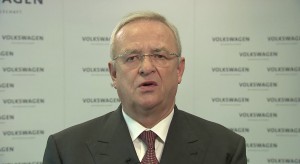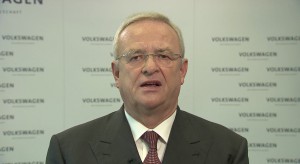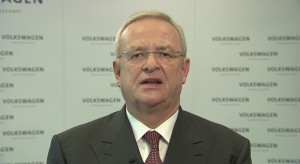In an industry with a penchant for dramatic departures of executives, Martin Winterkorn’s resignation is certainly one of the most spectacular.
In less than a week, Winterkorn went from contemplating a contract extension that would have left him in charge of the VW Group through 2018 and possibly longer to now having time to perhaps volunteer at one of the shelters in Germany that is now taking in refugees from the Middle East.
The German press speculates that Winterkorn will be replaced by Porsche CEO Matthias Müller, 59.
Winterkorn’s resignation comes just as his ambitious goal of surpassing Toyota as the world’s leading automaker was coming to pass. Assuming the title comes in no small measure courtesy of the bold expansion into China championed by Winterkorn that made VW the dominant company in the largest car market in the world.
Winterkorn also patiently rebuilt Volkswagen’s reputation for technical prowess and clever design. He also developied Audi into a luxury brand that is now challenging its German rivals such as Mercedes-Benz and BMW while eclipsing other luxury carmakers such as Cadillac and Lexus both in buzz and product innovation.

Winterkorn steps aside just as his ambitious goal of being the world's largest automaker seemed to be coming to fruition.
However, one of Winterkorn’s big achievements, the promotion of “Clean Diesel” technology, proved to be his undoing. Diesel engines and their toxic emissions pose a serious threat to public health, according to numerous and well-documented studies around the world, had been a target of regulators for years.
Winterkorn, with help from other German carmakers such as Daimler AG, had almost succeeded in changing the image of diesel engines from noxious polluters to allies in the fight against climate change by touting the superior fuel economy of the new generation of diesel engines using clever strategies to limit pollutants.
The strategies employed by VW under Winterkorn proved to be too clever. Some dogged sleuthing by a handful of engineers and scientists in the U.S. uncovered the fact that VW’s diesel-powered vehicles performed very differently on the road than they did in the test cell.
The investigators told Car and Driver they originally thought there test results were in error because the discrepancies were so large. It turned out they weren’t and the findings were turned over to the U.S. Environmental Protection Agency, which took up the issue with VW executives.
Initially, VW denied any wrongdoing, but when the EPA threatened to withhold certification of diesel engines sold in 2016 models, the company caved and admitted it had set out to defeat the emission tests.
(VW cheating scandal reveals “systemic” problem. For more, Click Here.)
EPA public disclosure of VW’s misfeasance blew up like an old 500-pound bomb left behind from World War II underneath a street in some quiet German town. The damage was stunning.
The company’s stock plunged in value losing almost 20% of its value immediately – and as much as $26 billion off its market cap in the two days following the revelation – and the German automaker could face up to $18 billion in fines, according to EPA’s calculations. Analysts dismiss the notion that VW could be forced to pay that kind of money.
However, VW has confirmed that it installed software designed to circumvent emissions standards in 11 million diesel vehicles worldwide, and estimated the cost of a service program to remove the so-called “defeat device” at $7.3 billion for the third quarter of 2015.
Volkswagen also was hit with at least nine class action lawsuits – and the number is still growing – by U.S. drivers seeking damages for diesel-burning autos that the manufacturer touted as environmentally friendly, but the U.S. Environmental Protection Agency recently revealed were designed to fool emissions tests.
Additionally, VW also faces substantial fines in the state of California. Roughly 15% of the clean diesels VW and Audi sold in the U.S. were sold in the state of California, according to a calculation by Kelley Blue Book.
In his resignation announcement, Winterkorn said he was stunned by the revelations of the past week but insisted he had never done anything wrong personally during his tenure at VW, which certainly made him look like one of the most hands-off executives of all time.
“I am shocked by the events of the past few days. Above all, I am stunned that misconduct on such a scale was possible in the Volkswagen Group,” he said.
“As CEO I accept responsibility for the irregularities that have been found in diesel engines and have therefore requested the Supervisory Board to agree on terminating my function as CEO of the Volkswagen Group.
“I am doing this in the interests of the company even though I am not aware of any wrong doing on my part. Volkswagen needs a fresh start – also in terms of personnel. I am clearing the way for this fresh start with my resignation.”
(Overwhelmed by cheating scandal, Winterkorn resigns. Click Here for the latest.)
VW’s Board of Supervisors, which can hire and fire executives, had clearly lost confidence in Winterkorn, seemingly overnight. The union representatives, who make up half the board, were clearly worried about the potential impact on the company’s reputations on jobs. The Piech/Porsche family, headed by Ferdinand Piech, who openly criticized Winterkorn last spring before stepping down as chairman of the board supervisors, was also ready to pounce.
As it stands, VW’s reputation has taken a huge hit.
“The important issue here is that Volkswagen deliberately set out to violate the public’s trust by manipulating EPA results,” noted Jack Nerad, executive editorial director and executive market analyst, Kelley Blue Book. “Simply put, VW buyers did not get the performance and environmental impact that they paid for, and because of that VW owners are less likely to ignore this or see it as a small issue.
“Volkswagen owners are notably loyal and knowledgeable and that goes double for VW diesel buyers, so this amounts to a betrayal of their trust that they are less likely to forgive than if they had less emotional attachment to their car and their brand.”
Nerad added Volkswagen and Audi went to considerable lengths to portray their brands and environmentally friendly and forward-thinking at the recent Frankfurt motor show. This news, coming on the heels of the show, does a great deal to negate those efforts.”
Jason Vines, a respected public relations consultant, who was in charge of PR during the Firestone debacle also weighed in via a post on Facebook.
“In my book ‘What Did Jesus Drive?’ I questioned, in the last chapter, if the General Motors ignition switch debacle would surpass the Ford/Firestone tire crisis. I think the jury is still out as 271 people died due to defective Firestone tires on Ford Explorers. Only 174 people died due to GM’s malfeasance. Only? Geez. But what tips the scale for me is that someone or some people at GM knew they had a problem and covered it up.
(Not the first time VW caught cheating. For more, Click Here.)
“But, just when you thought it was safe to go back on the road again, the world’s largest automaker (for now) out does both Firestone and General Motors. Sure, no one has died thanks to VW’s planned cheating of emission rules, thank goodness, but this is in some ways worse. This isn’t making a mistake or building a defective product. This isn’t about finding a problem and covering it up. This is about willful deceit. This isn’t one or two engineers. This is a corporate policy to violate the law,” Vines noted.



I’m surprised the Big Three (or at least Big Two) didn’t know about this based on competitive testing.
There is nothing to know about as far as I can tell. The diesels pass all emissions test. Where VW went wrong is someone chose to disable some emission controls when the vehicle was in motion. Anyone can do that as long as investigators do not check the vehicle when in motion. The software defeat probably improved fuel economy a small amount which is important to many people. No one has said how much difference there actually is in emissions or fuel economy other than sensational quips of up to 40 time more NOx than allowed.
Winterkorn didn’t have much chance of surviving these deal due to a tragedy/scandal always requiring a scapegoat. The big cheese rarely gets the boot except in deals like this. They understand when they sign on for big bucks that there is always the risk of a product defect ending their career be it an ignition switch, emissions controls or false beliefs of a defective tire.
BTW I never saw any scientific data that supported the theory that the Firestone tires were defective instead of under inflated and routinely driven into curbs to the point of causing them to fail. U.S. driver ineptness would account for them not understanding that a high center of gravity allows a vehicle to roll over at slower speeds than with a lower center of gravity. The U.S. education system leaves a lot to be desired. Lawyers take full advantage of these situations to enlarge their bank account balances.